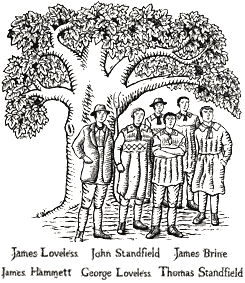
Britain's trade unions are typically associated with its industrialised cities, but the roots of an organised labour movement can be traced to rural workers, squeezed out by the Inclosure Acts of the late 18th and early 19th Centuries. These acts essentially handed areas of common land to the rich, denying members of the public their traditional right to graze their livestock there and re-establishing a feudalist system of land ownership.
In 1834, The Friendly Society of Agricultural Labourers was formed by six men from the small Dorset village of Tolpuddle near Dorchester, lead by the methodist preacher George Loveless. They met beside a sycamore tree in the village square and drew up plans "to preserve ourselves, our wives and our children from utter degradation and starvation". Despite the average family expenditure of the time being over 13 shillings, the men were seeing their wages reduced to below seven shillings. The group avowed they would refuse to work for less than 10 shillings a day.
At the time, the government had been rocked by a succession of Swing Riots, in which agricultural labourers across the south of England had destroyed farm machinery and maimed cattle in protest against threats to their livelihood. When local landowner James Frampton cited the obscure 1797 Mutiny Act in an official complaint about the group to the Whig government, the opportunity presented itself to make an example of them. The six: Loveless, his brother James, his brother-in-law Thomas Standfield, Thomas's son John, James Brine and James Hammett, were all transported to Australia.
Within three years, all had been pardoned and released. On his return, Loveless wrote an account of their case, The Victims of Whiggery, while James Loveless, Thomas Standfield and Brine co-wrote The Horrors of Transportation. Both publications are now seen as essential texts in the birth of trade unionism, and the village green and tree where the men met is conserved by the National Trust for its historical significance.

No comments:
Post a Comment